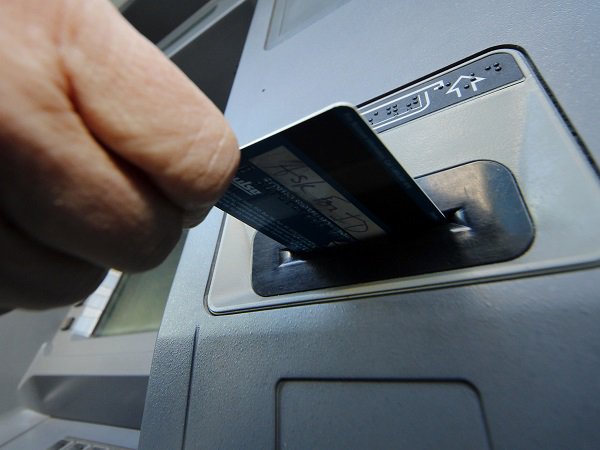
INQUIRER PHOTO
REPLACE depositors’ ATM cards with EMV cards.
This call was made by the Bangko Sentral ng Pilipinas (BSP) as it reiterated its call for banks to put in place additional security measures for the automated teller machines (ATM), amid reports of skimming incidents in Cebu City.
Lawyer Leonides Sumbi, BSP Cebu regional office director, said that one of these measures is having depositors’ old ATM cards replaced by new EMV cards.
“While we can’t say these EMV cards can’t be compromised, at least it’s one step to ensuring the safety of the banking public’s money,” she said in an interview with Cebu Daily News.
EMV stands for Europay, Mastercard and Visa, named such after the three companies that originally created the standard.
Sumbi said that based on a BSP study, EMV cards are harder to crack than the traditional ATM cards.
“Skimmers” use devices that can copy depositors’ data from the magnetic stripes found at the back of ATM cards, but EMV cards, Sumbi said, are more difficult to exploit since these store data on integrated circuits.
On Tuesday, the BSP received reports that a suspected skimming incident occurred at the ATM of the Land Bank of the Philippines (LBP) in Barangay Banilad, Cebu City, last Saturday where a government official fell victim.
Sumbi said that based on initial data, the scammers may have used a device employing technology “higher” than that in previous cases.
CDN sought officials of LBP for comment, but those reached by the paper refused to issue a statement.
All banks under the BSP are required to comply with the EMV policy starting January this year, but Sumbi said only 85 percent of commercial banks in Cebu have complied.
She said that what is holding some banks back, aside from the conversion being costly, is the lack of willingness among depositors.
“Even if their cards aren’t EMV standard, they can still withdraw money with it. So they end up procrastinating or not switching at all,” said Sumbi.
She said banks also cannot compel depositors to switch to EMV, unless they would disable their accounts, which the BSP will not allow since it would send the wrong signal.
As such, the BSP can only remind banks to encourage their depositors to comply with the new policy.
While the BSP no longer owns the money in commercial banks, it does provide them guidelines on how to ensure security and safety.
“For banks, they need to go slow on offsite ATMs or those machines located far away and with very few people. It’s good if they can provide a system where they can check on it every morning or in the middle of the day,” said Sumbi.
She said account holders should also be reminded not to give their personal identification numbers (PINs) to anyone as well as to be mindful of the facade of the ATMs and to report any suspicious-looking contraptions attached to these machines.
In case a depositor falls victim, Sumbi said it is still possible to recover money believed to have been lost to scammers.
She said the depositor needs to prove that they did not withdraw the amount that was lost at this time or place, based on the bank’s transaction records and ATM camera footage.
Sumbi said that banks are obliged to pay back the depositors their money if they can prove that this was lost through an unauthorized withdrawal.
Eugene Rigodon, president of the Cebu Bankers Club (CBC), for his part, said they are still verifying whether the incident really involved skimming.
“We can’t treat these complaints at face value because banks have their own internal investigation to conduct,” he said in a separate interview.
Rigodon reminded the banking public anew to be conscious of their account balance.
He said that if they notice anything suspicious in their balance, they should not hesitate to report it to their banks so immediate action can be taken.
He added that it was also important to change one’s PIN regularly, even monthly, if possible.
Lastly, he encouraged the public to withdraw from ATMs located at a bank’s branch since more security features are in place there compared to offsite ATMs.